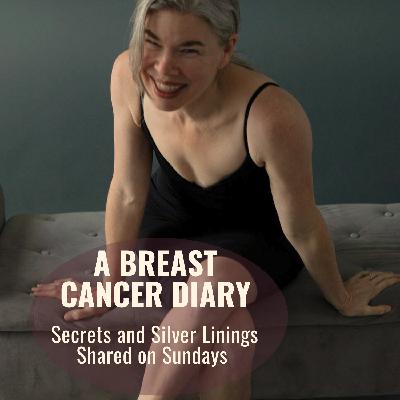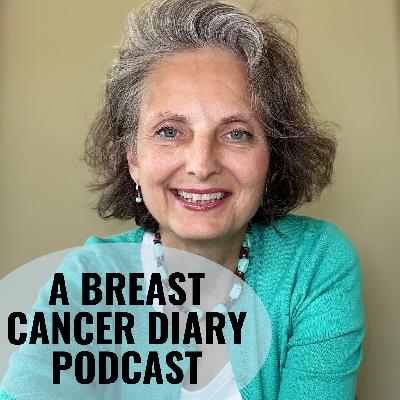The ABC's of Breast Cancer Advocacy
Description
Today I'm just talking from my own experience about some of the simpler ways to "stay in" the breast cancer community as an active advocate.
Here are some of the organizations that came up:
After Breast Cancer Diagnosis gives and trains mentors here: https://abcdbreastcancersupport.org/
Stand Tall AFC is the flat visibility organization that I work for: https://standtallafc.org
Lobular Breast Cancer Alliance welcomes advocates of all types: https://lobularbreastcancer.org
Wildfire Magazine is here: https://www.wildfirecommunity.org/
AskEllyn's blog is here: https://askellyn.ai/lifestyle-blog-sharing-breast-cancer-wisdom-stories/
Blessing Box, out of Texas, is here: https://blessingboxproject.com/
Knitted Knockers is here: https://www.knittedknockers.org/
Transcript:
Today I want to talk about advocacy, and I realize that I have so much to say on this subject that I think I'm gonna do two episodes on it. So, this will be the first of two in a two-part series, and I think this is a really important topic. I kind of wish that I had addressed it earlier. I've had a lot of folks asking me about advocacy lately, and it's a tricky topic because you don't really approach it in the same way in other parts of life. Um, we don't see a lot of people, uh, for example, you know, when you get diabetes, you don't hear about diabetic advocates, but you do in the breast cancer community a lot. And I think it's because it's a women's health issue. And women's health issues, usually they involve some amount of maybe injustice or a lack of power, or a lack of notoriety, traditionally. I think that that is not true at this point about breast cancer, but for whatever reason, the breast cancer community has really pushed itself into the public eye in so many different ways. And so now being an advocate in this space is very normative.
And yet most people don't know as they enter the breast cancer community as a new patient, what it really means to be an advocate. And if they have permission to be an advocate. So advocacy is actually one of the main reasons that I started this podcast. I wanted to tell the stories of all of the amazing advocates that I've met in the world, and I meet more and more every year, and I never seem to run out of interesting advocacy stories, and yet I've never really qualified that... I've never said, well, this is today's advocate is as I'm interviewing people. So I've done a poor job of defining what an advocate is and. That's mostly because it's pretty hard to define. It is so broad reaching and multifaceted, and it can be very simple or it can be very complex. And so today I wanna talk about the ways to do advocacy that are simple.
And next week I'm gonna talk about the ways to do advocacy that are a little bit more complex and involve a little more education and oversight. Uh, maybe some mentoring, maybe some coaching from others along the way. So first I wanna define my. Kind of idea of what it means to be an advocate in this context.
Unfortunately, the word advocate stems from a Latin word, which means lawyer. And so a lot of people when they hear this word advocate, they think about legal spaces. And I, most of all, because I actually had one of my, uh, most recent jobs actually was working for, uh, the foster care community. .
There's an organization that's a national organization called CASA, which is court appointed special advocates, is what CASA stands for. And CASAs are volunteers that go into the court system and advocate for foster kids in a way that their attorneys can't. And I won't go into that because it's a totally different subject, but like most people, I have the same association of the legal system when I hear the word advocate, but in our culture and in our language, advocate means something different. It means supporter of a cause or public support of a cause or a group.
And that's what we mean when we stand in the breast cancer community and use the word advocate or the word advocacy. We just mean support and raising your voice in some way. Or doing an action in some way that supports this cause or this group, or in most cases, a subgroup of this larger group of breast cancer patients and breast cancer science and all the different ways that we need to be active in breast cancer.
And so the simple ways that you can do that, uh, and still call yourself an advocate legitimately, are to raise visibility and support in any of the niches that are involved in breast cancer culture. So first off, visibility. What does that look like? Well, it means raising awareness and showing up in groups where there's under, or misrepresentation of a minority group. So in breast cancer, there are many minority groups. There are the typical minority groups which have to do with race and gender, and then we have other minorities that have to deal with subgroups of diagnoses and, um, subgroups of, of breast cancer itself.
So we have the triple negative subgroup that represents about 15% of the total population of those diagnosed with breast cancer and the lobular breast cancer subgroup, which also represents about 15%. And then there's inflammatory breast cancer, which has a smaller percentage. And then there's other kinds of even more rare, uh, diagnoses like LCIS, for example, which is pretty rare, um, as opposed to DCIS, which is the more common type of precancer. And then there's the markers, which triple negative does refer to, but there are people that are triple positive and that's a pretty rare category of markers and diagnoses. So, I don't think that there's any triple positive advocacy groups out there in the world. But there are triple negative advocacy groups and um, and then the category of metastatic stage four cancer is another major subgroup in breast cancer culture and breast cancer community that is highly under and misrepresented, um, in terms of the number of dollars that go toward the research to pro provide a cure.
Traditionally, although there is more and more research now. Oh, and I didn't mention, there's also the subgroup of the type of closure you get after mastectomy. So that's another area where I am highly involved in raising awareness and visibility is for flat closure as opposed to the main. Kind of closure that gets a lot of support and accolades right now, which is implants, um, as a, a way of walking away from mastectomy. And then deep flap is the other way that is a little bit more commonly endorsed by the medical community, but flat closure is a lot less endorsed in this day and age.
So raising visibility, what does that look like? Well, it can look all kinds of different ways. It really basically means just not staying hidden in your identification with a particular minority group or a niche of the breast cancer community.
So being active on your own social media platform is actually an active advocacy. So even if you never leave your house or talk to another person in real life about the kinds of things you're dealing with. In your subgroup of the breast cancer community, if you feel like you're underrepresented and that that topic or that diagnosis or that subgroup is not getting as much visibility as it should, you have the option to go online and make a statement to your community or the wider community at large about how much you care about that.
And that is raising visibility. And in my book, that is advocacy big time. And I think that's the way that most of us start as an advocate is just going onto Facebook or Instagram or various other social media platforms and telling our stories and telling why this part of my story is really important to me and why the fact that other people aren't seeming to value that part of my story or that part of my breast cancer experience.
Uh, is is even more important to me to bring it into the light when it seems to be being shoved into the darkness or into the corners. And so we have an amazing tool at our disposal right now to raise awareness and raise visibility for all of these things. And we can do it in isolation as a single agent, or we can do it in community and in groups and non-profit and other charitable organizations.
So when you want to attend a larger group gathering that is for advocates in particular, you do have to many times have a sponsoring group or agency or nonprofit that you're identified with as an advocate and that. I will leave for next week's exploration of advocacy because that's a little bit more, um, of a complex relationship with advocacy than what I was gonna discuss today.
But in terms of visibility and support, um, I just wanted to say that you are counted among us as an official advocate, even if you aren't associated with a nonprofit, a government agency, or some other charitable organization, even though you might not get into NBCC's project LEAD, for example, without an organization sponsoring you or, um, you may not get to be a part of something, uh, that would call you an advocate and bring you up to the stage as an advocate, quite as







